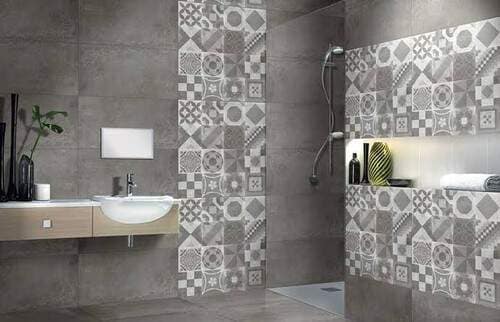
Which floor tiles is good for wet or bathroom area?
Which floor tiles are good for the wet or bathroom area?
The endless
stream of options might leave you feeling overwhelmed and confused about which
tile to choose.
In this article, we will tell you what factors you should consider when deciding the tiles for
your bathroom.
This would help
you in narrowing down your list and help in choosing bathroom
flooring clearer.
The types of
flooring which are generally suggested for bathrooms are porcelain, natural
stone, ceramic tile, etc.
We will tell you
about the qualities of these various flooring and how they suit the bathroom
conditions.
With bathrooms
you have to care about the material chosen because what you choose should be
able to withstand water flow in the bathroom, it shouldn’t be porous and give
way to seepage.
The flooring
shouldn't be slippery either.
That’s why the
shower area should have smaller tiles because it would increase traction and
would be safer.
The risk of
slipping in the shower would considerably decrease.
Whereas the
other area of the bathroom should have larger tiles, which are easier to clean and
maintain.
People generally
use white tiles for the bathroom, this helps in making the bathroom look spacious and
open since the size of the bathroom is generally small.
But it would be
wiser to choose lighter colors instead of white as over time the white tiles
start looking shabby and ruin the appearance of the bathroom.
Porcelain is
very good in terms of durability and quality.
There is no
requirement of sealing a glazed porcelain tile and its maintenance and cleaning
are easy too.
Due to
advancements in technology porcelain tile can simulate natural products such as
wood and stone.
After porcelain,
the next popular material of choice is ceramic tile.
It is less
durable than porcelain and could also be more prone to scratching.
Thus this kind
of flooring is not ideal for public spaces but could be a good choice for
homes.
Natural stone tiles
are undefeated in terms of the availability of patterns and colors.
The beauty of a natural stone is unique and can’t be replicated by engineered stone and
laminates.
The strength of the natural stone is also high and they are easy to clean.
Natural stones
give a classy look.
But one must remember
that natural stones are porous and therefore not readily chosen for
bathroom and other wet areas.
If you
do want to install natural stone flooring in the bathroom then you should make sure that the stone is treated with a sealer.
This process needs to be repeated.
It is quite easy to do so and could be done
without any professional help also.
Concrete
flooring is also a good option for bathroom and wet areas but it is often
overlooked.
Having concrete
flooring is very economical and one can use pigments to have colored concrete
flooring.
One should ensure
that it is properly sealed.
Concrete flooring
can be made moisture-resistant and stain-resistant, this would ensure that
your bathroom remains free of germs.
It is very easy
to clean and maintain.
Also, it is a
more sustainable option.
There has been a
world of difference in concrete finishing.
It would lend a
rustic look to your bathroom depending on the color you go for.
These are the
different types of flooring that are suggested for the bathroom.
Choose the
flooring depending on the decor theme you have and the one which complements
your walls.
Choose the
material based on your budget and the kind of time you can devote to a particular type of flooring.
The flooring shouldn't be slippery either.
Easy Nirman Construction was Never Easy Before Us









No Comments yet ...